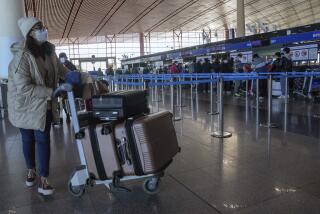Swine flu moves other nations to act
- Share via
SEOUL AND MADRID — Reaction to the spread of swine flu may seem muted in the United States, despite its proximity to the deadly outbreak in Mexico.
But that’s not the case in Asia, Western Europe and the Middle East, where the threat of a pandemic has quickly led people to don protective masks and officials to screen tourists, ban meat imports and advise against travel to the Americas.
The responses follow a series of microbial scares in recent years that include avian flu, severe acute respiratory syndrome, or SARS, and mad cow disease.
The tactics in Asia, which include high-tech screening of airline passengers for fever, new quarantine facilities, heightened public vigilance and a scurry for scientific research, come straight from a playbook devised during the SARS and avian flu crises.
SARS killed about 800 people, mostly in mainland China and Hong Kong, in 2003. Avian flu has killed 257 worldwide since 2003. From Japan to Malaysia, officials are taking no chances, and residents are donning protective masks.
“SARS frightened the world, but the place it frightened most was Asia -- Hong Kong, China, Vietnam,” said Peter Cordingley, a spokesman for the World Health Organization’s office in Manila. “The lessons Asia learned from SARS are still around as the world faces this new virus.”
The anxiety level also runs high in other regions.
In Spain, where at least 30 possible swine flu cases have been reported, teams of doctors and police officers wearing masks and surgical gowns boarded arriving planes, distributed forms for contact information and advised passengers to seek treatment if they experienced symptoms.
And in Egypt, which is struggling with bird flu, the Health Ministry ordered the slaughter of the country’s estimated 300,000 pigs.
The farther away from Mexico, it seems, the quicker nations have erected defenses.
France, where 20 suspected cases are under study, has amassed enough doses of Tamiflu, an anti-influenza drug, to cover half the population of 60 million.
British Prime Minister Gordon Brown told Parliament that the number of doses of antiviral drugs available to the public would be increased from 33 million to 50 million.
Russia has banned meat imports from California, Texas and Kansas, and China has banned the import of pork from the three states plus Mexico, despite a lack of evidence that swine flu can be transmitted through meat.
In Spain and Australia, airline pilots have been told to report passengers with apparent symptoms.
Tour companies in Asia and Europe were temporarily curtailing ventures to Mexico.
Japan has warned its citizens to leave Mexico, and officials are preparing for school closures, reduced business hours and stay-at-home curfews.
Asian nations may have the most tools for acting quickly.
At Seoul’s Incheon airport, officials have expanded the use of thermal cameras to monitor body temperature of arriving international passengers. South Korean authorities have quarantined one woman and are testing nine additional possible swine flu cases, and agriculture officials suspended certain types of pig imports from Mexico, the U.S. and Canada.
Analysts say a 2008 scare over mad cow disease and U.S. beef imports has made South Koreans feel vulnerable to any risk of an imported pathogen.
“One characteristic of our nation is being oversensitive about food and matters involving food -- attributed to rumors surrounding mad cow disease,” said Kim Ki-seuk, president of the Korean Society of Veterinary Public Health.
“Experience is very important. Since 2000, South Korea has been hit by diseases such as foot-and-mouth disease and avian flu and survived them.”
Cordingley of the WHO said that since the SARS crisis, Asian countries have become primed to respond.
“Public health systems were fast asleep when SARS struck,” he said. “They weren’t ready for an attack of infectious disease. . . . SARS came out of left field. Since then, vast amounts of money have been spent by Asian nations to make sure they’re not caught napping a second time.”
He noted Hong Kong as a prime example of readiness.
“The city has isolation wards and has trained doctors and nurses in infection control, and similar things have happened across the region,” he said. “If you spent any time in an isolation ward during the SARS outbreak in 2003, you don’t forget that.”
--
Times staff writers Jeffrey Fleishman in Cairo, Barbara Demick in Beijing, Megan K. Stack in Moscow and Maria De Cristofaro in Rome, and Ju-min Park of The Times’ Seoul Bureau, Noha El-Hennawy of The Times’ Cairo Bureau and Janet Stobart of The Times’ London Bureau contributed to this report.
--
BEGIN TEXT OF INFOBOX
The toll
Confirmed swine flu cases as of 9 p.m. Wednesday, PDT:
United States ...95
New York ...51
Texas ...16
California ...15
Maine ...3
Kansas... 2
Massachusetts ...2
Michigan ...2
Arizona ...1
Ohio ...1
Indiana ...1
Nevada ...1
Mexico ...99
New Zealand ...14
Canada ...13
Britain ...5
Spain ...4
Germany ...3
Israel ...2
Peru ...1
Austria ...1
Sources: Centers for Disease Control and Prevention, World Health Organization, state agencies, Associated Press and Times research
More to Read
Sign up for Essential California
The most important California stories and recommendations in your inbox every morning.
You may occasionally receive promotional content from the Los Angeles Times.











